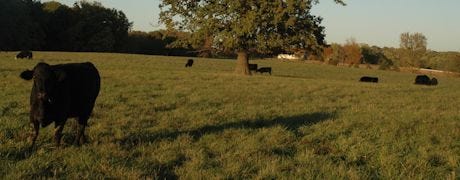
It has been the typical Missouri weather pattern, two days with temperatures in the 80s and then three days of temperatures dropping into the 50s. And while there is plenty of precipitation, one University of Missouri forage specialist says it will take more warm weather to obtain optimal growth of pasture grasses.
While there are some pastures greening up across the state, these fields are not putting on the pounds of dry matter needed by the state's graziers. In fact, some livestock producers are still feeding winter hay.
Rob Kallenbach, University of Missouri forage specialist, says he hears two frequent complaints: The grass is not growing. And there are more weeds than usual.

Kallenbach says this year is the time for rotational grazing to extend forage. Graze the grass down to a 3-inch stubble, remove the herd, and let the grass rest for 30 days. Farmers should manage growth of pasture grasses to extend grazing well into June.
Warm weather needed
He says the first complaint is a result of the cool spring. For pasture grasses to grow there needs to be warm sunshine, he explains. Right now, there is plenty of moisture in the soil to support growth, but grey, overcast days do not facilitate plant growth.
He says farmers across the state are finding one-third the growth of just one year ago in grazing paddocks. Last April, they were reporting growth averaging 90 pounds of dry matter per day per acre. This year, growth is less than 30 pounds per day.
Kallenbach says with warm weather pastures will jump up quickly. Sugars from photosynthesis make rapid growth. However, he warns that if livestock producers have been grazing cattle on depleted pastures all spring it may be a slower recovery. Cattle nip off leaves that create energy for regrowth.~~~PAGE_BREAK_HERE~~~
He adds that this year is the time for rotational grazing to extend forage. Graze the grass down to a 3-inch stubble, remove the herd, and let the grass rest for 30 days. Farmers should manage growth of pasture grasses to extend grazing well into June. Turning cattle into pastures too soon can hurt that process. He says farmers should be patient before turning cattle out and wait for warmer days and more pasture grass growth.
Weeds present a problem
However, one thing that is growing in pastures is weeds. Kallenbach says this is due to a hot, dry summer last year. Weeds in pasture are filling bare spots caused when grass died in the drought.
Winter annuals, such as henbit and chickweed, are nature's way of filling a void. The seed was already in the soil, waiting for a chance to grow. Cows will graze chickweed, which is nutritious. The only problem is that there is not much growth there. Cattle avoid henbit.
The concern is what will fill those bare spots after winter annuals are gone, Kallenbach says. If crabgrass grows, that is good. If horse nettle grows, that is not good. Tall weeds shade grass and reduce growth.
Some grasses, such as fescue, can be aggressive in reclaiming bare spots, given some good grass-growing weather.
While the long-range outlook calls for a return to normal temperatures and an opportunity for more growth of pasture grasses, Missouri's weather is full of surprises, like snow in May.
Source: University of Missouri Extension
About the Author(s)
You May Also Like






